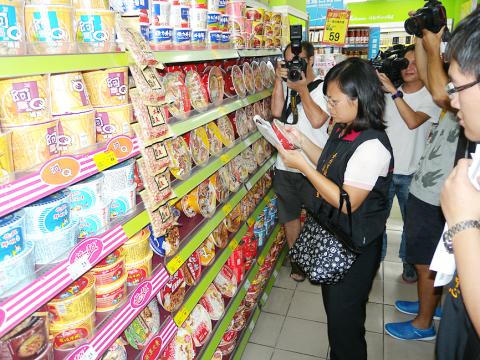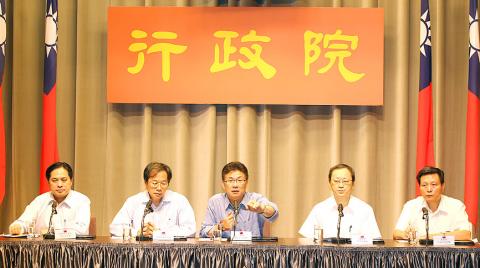The Greater Kaohsiung Government Department of Health yesterday fined edible oil manufacturer Chang Guann Co (強冠企業) NT$50 million (US$1.67 million) over its peddling of lard oil tainted with recycled waste oil.
The fine is the highest that can be imposed on violators of Article 15-1 of the Act Governing Food Safety and Sanitation (食品安全衛生管理法), which prohibits the manufacturing, processing and selling of foods or food additives that have deteriorated or gone rotten.
The department has also referred company chairman Yeh Wen-hsiang (葉文祥), to the Kaohsiung District Prosecutors’ Office for investigation.

As of 2pm yesterday, the Food and Drug Administration (FDA) had identified 1,256 companies that bought a total of 782 tonnes of “Fragrant Lard Oil” manufactured by Chang Guann between March 1 and last month made with recycled waste oil provided by the owner of a Pingtung-based unlicensed factory, Kuo Lieh-cheng (郭烈成).
Kuo allegedly obtained waste oil recycled from restaurant fryers from waste recycler Hu Hsin-te (胡信德), whose factory, named Shun Te Enterprise (順德企業行), in Greater Kaohsiung’s Daliao District (大寮) was shut down yesterday by the local government’s Economic Development Bureau after it was found to be unregistered.
Fourteen more food products were drawn into the oil scandal yesterday, bringing the number of types of products contaminated with the tainted lard to 222.

Photo: CNA
Among them, eight were from Greater Kaohsiung-based Ching Hsin Fresh Food Factory (晉欣鮮食廠), which provides foodstuffs to the 450 southern branches of Taiwan FamilyMart Co (全家便利商店), Taiwan’s second-largest convenience store chain.
FDA Northern Center for Regional Administration Director Feng Jun-lan (馮潤蘭) said nearly 99 percent of the 222 types of tainted food products have been pulled off the shelves and sealed, weighing 228 tonnes in total.
“They are to be destroyed by health departments nationwide in the near future,” Feng said, adding that her agency was still tracing the whereabouts of about 79 of the 782 tonnes of tainted lard oil.
Separately yesterday, Vice Premier Mao Chi-kuo (毛治國) described Chang Guann’s selling of substandard lard oil as a “vile criminal act” and demanded the severest penalties for the perpetrators.
Mao was quoted by Executive Yuan spokesperson Sun Lih-chyun (孫立群) after the first meeting of an inter-ministerial task force established on Friday last week to deal with the tainted lard scandal.
At a press conference after the meeting, Sun said the fact that the tainted lard oil had been mixed with something not meant for human consumption was enough to make it an illegal product, regardless of whether it met legal standards, as recent FDA test results found.
Health and Welfare Vice Minister Hsu Ming-neng (許銘能) said the FDA only tested samples of the questionable oil for substances for which the government has set a maximum permissible level, such as heavy metals.
“The ministry is to discuss with experts in the area other kinds of substances that should also be tested for in the future,” Hsu said.
Mao also quoted representatives from the Ministry of Justice as saying at the meeting that investigators were checking into the bank accounts belonging to the companies and individuals involved in the case to ensure that all their illegal gains were confiscated.
As for other ministries’ handling of the oil scandal, Mao said that the Council of Agriculture on Friday instructed the Pingtung County Department of Agriculture to seal and run tests on the oil produced by animal feed manufacturer Ching Wei Co (進威), which was allegedly made with waste oil procured from Kuo.
“The Ministry of National Defense has removed all food products that could have been contaminated with the lard oil from military stores, while the Ministry of Education has demanded that schools keep records of the edible oil they use and conduct regular spot checks on their meal providers,” Mao said.

A magnitude 7.0 earthquake struck off Yilan at 11:05pm yesterday, the Central Weather Administration (CWA) said. The epicenter was located at sea, about 32.3km east of Yilan County Hall, at a depth of 72.8km, CWA data showed There were no immediate reports of damage. The intensity of the quake, which gauges the actual effect of a seismic event, measured 4 in Yilan County area on Taiwan’s seven-tier intensity scale, the data showed. It measured 4 in other parts of eastern, northern and central Taiwan as well as Tainan, and 3 in Kaohsiung and Pingtung County, and 2 in Lienchiang and Penghu counties and 1

FOREIGN INTERFERENCE: Beijing would likely intensify public opinion warfare in next year’s local elections to prevent Lai from getting re-elected, the ‘Yomiuri Shimbun’ said Internal documents from a Chinese artificial intelligence (AI) company indicated that China has been using the technology to intervene in foreign elections, including propaganda targeting Taiwan’s local elections next year and presidential elections in 2028, a Japanese newspaper reported yesterday. The Institute of National Security of Vanderbilt University obtained nearly 400 pages of documents from GoLaxy, a company with ties to the Chinese government, and found evidence that it had apparently deployed sophisticated, AI-driven propaganda campaigns in Hong Kong and Taiwan to shape public opinion, the Yomiuri Shimbun reported. GoLaxy provides insights, situation analysis and public opinion-shaping technology by conducting network surveillance

‘POLITICAL GAME’: DPP lawmakers said the motion would not meet the legislative threshold needed, and accused the KMT and the TPP of trivializing the Constitution The Legislative Yuan yesterday approved a motion to initiate impeachment proceedings against President William Lai (賴清德), saying he had undermined Taiwan’s constitutional order and democracy. The motion was approved 61-50 by lawmakers from the main opposition Chinese Nationalist Party (KMT) and the smaller Taiwan People’s Party (TPP), who together hold a legislative majority. Under the motion, a roll call vote for impeachment would be held on May 19 next year, after various hearings are held and Lai is given the chance to defend himself. The move came after Lai on Monday last week did not promulgate an amendment passed by the legislature that

Taiwan is gearing up to celebrate the New Year at events across the country, headlined by the annual countdown and Taipei 101 fireworks display at midnight. Many of the events are to be livesteamed online. See below for lineups and links: Taipei Taipei’s New Year’s Party 2026 is to begin at 7pm and run until 1am, with the theme “Sailing to the Future.” South Korean girl group KARA is headlining the concert at Taipei City Hall Plaza, with additional performances by Amber An (安心亞), Nick Chou (周湯豪), hip-hop trio Nine One One (玖壹壹), Bii (畢書盡), girl group Genblue (幻藍小熊) and more. The festivities are to